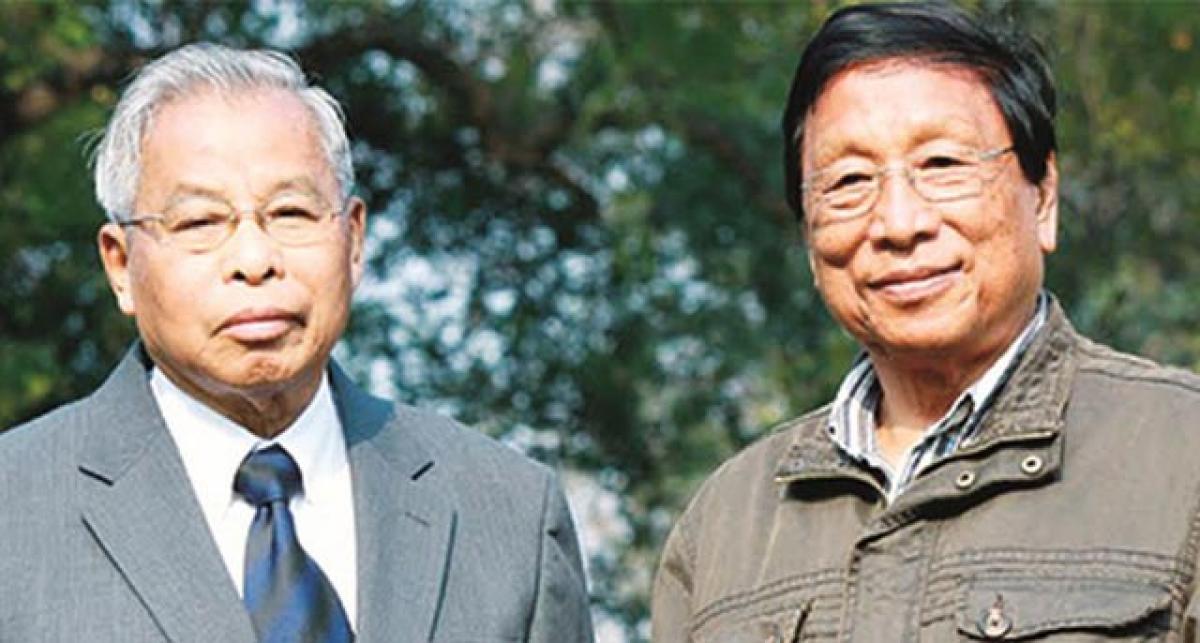Live
- ‘Get Set, Grow Summit 2024’ Focuses on Digital Detox for Families
- Stokes motivates his team to put in extra effort, says England pacer Potts
- From overcoming setbacks to leading India in U19 Women’s Asia Cup, Niki Prasad's amazing journey
- Driving Enterprise Security: Inside Venkata Reddy Thummala’s Leadership Journey
- Constitution debate: PM Modi hails 'Nari Shakti'; makes strong pitch for 'United Bharat’
- Abhijeet Bhardwaj: Revolutionizing Enterprise Analytics with Innovation and Expertise
- Bihar: Inquiry initiated against principal who went to buy veggies during school hours
- Press Sri Lankan Prez for release of Indian fishermen: TN Cong MP to EAM Jaishankar
- TN: DMK postpones executive meet due to heavy rains & Parliament session
- Porous silicon oxide electrodes can fix durability issues in batteries: Researchers
Just In

As Isak Chisi Swu, staunch Naga rebel and co-founder of National Socialist Council of Nagalim (Isak-Muivah), met his life\'s end after months of combating chronic health issues, the Naga clan on Tuesday lost one of its main leaders, who continues to be a source of inspiration for thousands of Naga youths.
New Delhi: As Isak Chisi Swu, staunch Naga rebel and co-founder of National Socialist Council of Nagalim (Isak-Muivah), met his life's end after months of combating chronic health issues, the Naga clan on Tuesday lost one of its main leaders, who continues to be a source of inspiration for thousands of Naga youths. Of course, the history of the last six decades in the state has been a saga of brutal killings and deep conflict.
According to many senior rebel leaders from various factions of the NSCN, though the death of Isak Swu was sudden and unexpected, he himself would have been happy that he and T. Muivah co-founder of NSCN-IM could at least make the Indian government understand the gravity of the Naga conflict and ink the historic Naga Peace Accord in 2015.
Born to an economically well-off Sema family in Chishilimi village of Zunheboto district in Nagaland and having graduated from Shillong-based St. Anthony's College, Isak Swu's legendary role in the Naga revolution seemed pre-decided since birth. After joining the Naga National Council (NNC) in his early 20s, then the only armed group fighting for the Naga cause – under the leadership of Angami Z Phizo, Isak Swu went on to became the "Foreign Secretary" of the group.
It won't be wrong to say that during the early 1950s, when the Naga insurgency saw its inception, it was the contribution of Isak Swu, Muivah and SS Khaplang among several other leaders of NNC who accelerated the movement in the state. Phizo father of the Naga revolution was more into getting the Naga cause international attention after failing to convince the then Indian Prime Minister Jawaharlal Nehru.
"In the demise of Yariuwo Isak Chisi Swu, Nagas have lost not only a great freedom fighter but also a faithful servant of God. The vacuum created by his death will be difficult to fill," Lima Jamir, a veteran journalist from Nagaland, who has been close to the NSCN-IM, told IANS. Though he fought for the Naga cause for decades, Isak Swu was completely against the split in the Naga groups over ideologies, which according to him was the reason behind the delay in the solution to the Naga conflict.
Isak Swu and Muivah had created the NSCN-IM after misunderstanding erupted with Khaplang in 1988 while all of them were together in the NSCN, which again was a splinter group of the NNC after some members of the group quietly inked the Shillong Accord with the Indian government in 1975.
Having led most of his adult life in the jungles and hideouts of Myanmar and Bangladesh, Isak Swu was among the only Naga rebel leaders who insisted that the leadership get a ceasefire and then approach the Indian government for peace talks, an effort that finally led to the signing of the framework of the Naga Peace Accord on Aug 3, 2015.
It was the NSCN-IM, precisely Isak Swu and Muivah's style of running the armed group, which led many other armed groups of the Indian northeast to take training under them and learn the tactics of leading an insurgency. It is perhaps the stature of rebel leaders like Isak Swu which allowed the door to remain open for other rebel factions, including the NSCN-Khaplang, to join the Naga Peace Accord negotiations. The latter faction withdrew from the 14 year-old ceasefire in 2015.
Isak Swu was of the opinion that if there was a need for peace in Nagaland, then that would have been possible only through bringing all the factions on board. Till very recently, Isak Swu kept himself abreast of the negotiations being held between the NSCN-IM and the government from the hospital bed. With deterioration in his health, though, which included a series of surgeries, Isak Swu collapsed medically but was kept on ventilation until Tuesday when he was declared dead. He was 86. Apart from his wife, Isak Swu leaves behind five sons and a daughter.
By Rupesh Dutta

© 2024 Hyderabad Media House Limited/The Hans India. All rights reserved. Powered by hocalwire.com







